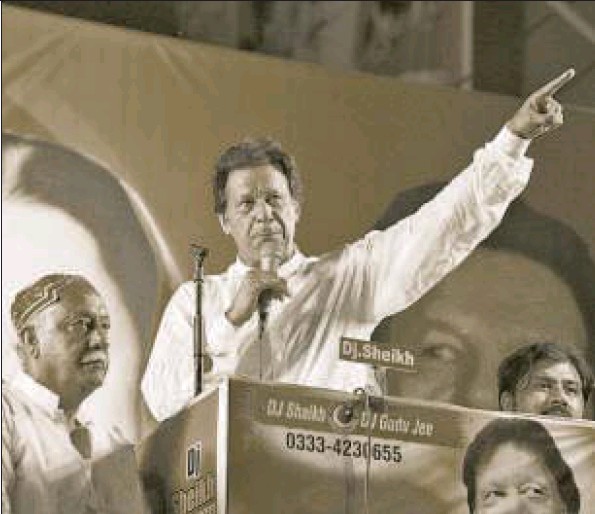- India shouldn’t rush into engaging with the new Imran-led Pakistan



Brahma Chellaney
New Delhi should let the new leader establish his bona fide intentions for combating terrorism first
It has taken the Pakistani military a full year to complete the soft coup it launched when it used a pliant judiciary to oust an elected prime minister. The military-engineered election outcome in favour of Imran Khan came virtually on the anniversary of Nawaz Sharif’s removal from office. What happened to Sharif is likely to happen to any PM that seeks to assert civilian control over a praetorian military.
The latest election has changed little in Pakistan, a country still struggling to be at peace with itself. The Pakistani military will remain the puppet master calling the shots from behind the scenes, with Imran Khan as its newest puppet
In fact, no PM has been allowed to complete a full five-year term. When a PM falls foul of the deep state, the judiciary, opposition and bureaucracy are used to smear the leader’s reputation and oust him or her. Every PM has been thrown out on charges of corruption and incompetence.
Pakistan’s Supreme Court hanged one elected PM in 1979, ousted another in 2017 and legitimised every military coup. Sharif was ousted without a trial, let alone a conviction. Turning natural justice on its head, the Supreme Court first pronounced him guilty of corrupt practices on the basis of the report of a military intelligence-associated joint investigation team and then ordered his trial postouster.
The Sharif removal anniversary last Saturday was a reminder that Prime Minister Narendra Modi’s surprise Lahore visit proved very costly for the now-jailed Sharif and for India, with the Pakistani military responding with a series of daring terrorist attacks on Indian security bases, from Pathankot to Uri and Nagrota. Modi’s visit sealed Sharif’s political fate, with the subsequent Panama Papers leak providing the perfect pretext for ousting him.
For India, this is not just a cautionary tale but a sobering lesson that policy made on the fly increases the odds of a boomerang effect. So does diplomacy seeking to befriend Pakistan’s civilian government in the hope of both offsetting Pakistani military’s implacable hostility to India and driving a wedge between civilian and military authorities. Such diplomacy has repeatedly recoiled on India. Didn’t Atal Bihari Vajpayee ride a bus to Pakistan and then publicly bewail that his “bus got hijacked and taken to the Kargil battlefield”?
The latest election has changed little in Pakistan, a country still struggling to be at peace with itself. The Pakistani military will remain the puppet master calling the shots from behind the scenes, with Imran as its newest puppet.
The military didn’t just stack the electoral odds in Imran’s favour; it did practically everything to put him in power. It took the general election to literally mean that it was to be run by the generals. The EU team found the voting “well conducted and transparent” but cited “restrictions on freedom of expression and unequal campaign opportunities.” Former Indian chief election commissioner SY Quraishi, however, gave the polls a clean chit.
It was the military’s brainchild to bring into the political mainstream the terrorists and militants assisting its belligerent India policy and Afghanistan meddling. In the election, not all the Islamists and militants fared badly. One militant group, Tehreek-i-Labbaik, garnered nearly two million votes. Even in the case of the terrorist-affiliated groups that were routed, the military has largely succeeded in its objective of mainstreaming them. The terrorists’ conversion into politicians means not just that they no longer are pariahs; their increasing political footprint in the coming years will likely extend Pakistan’s jihad culture to the polity.
The military has actually scored a double win. The next PM is a supporter of the military-backed jihadists and Islamists. Imran, long ridiculed as “Im the Dim” for his lack of intelligence, has morphed into a religious zealot who plays the blasphemy card and whose party brass includes hardcore extremists like Ijaz Shah, an ex-ISI officer and handler of Hafiz Saeed, Mullah Omar and Daniel Pearl’s murderer. Shah, now in Parliament, also helped hide Osama bin Laden.
Make no mistake: After this contrived election, Pakistan seriously risks slipping deeper into a jihadist dungeon. Its exploding population, resource pressures, a pervasive lack of jobs, high illiteracy and fast-spreading jihadism create a deadly cocktail of internal disarray. Caught in mounting debt to China, it now needs an international bailout.
Successive Indian governments have failed to develop a clear strategy to deal with this Mecca of terrorism. India’s policy pendulum onPakistanactuallyswingsfromoneextreme to the other — from vowing a decisive fight to making schmaltzy overtures. While Washington has cut off security assistance to Pakistan and periodically slaps new sanctions on Pakistan-based terrorists, India is loath to back its rhetoric with even modest diplomatic sanctions or by leveraging the Indus Waters Treaty, the world’s most generous watersharing arrangement. All talk and no action, by undermining Indian deterrence, has invited continuing cross-border terrorism.
Today, instead of rushing to engage Imran, New Delhi should let the new leader establish his bona fide intentions for combating terrorism. Tellingly, in his “victory” speech, he called Kashmir the “core” subject but evaded the central issue for India, Afghanistan, the US and Pakistan’s own future — tackling and terminating the presence of terrorist groups on Pakistani soil.
Brahma Chellaney is a geostrategist and author The views expressed are personal
DISCLAIMER:
The views expressed in the Article above are Author’s personal views and kashmiribhatta.in is not responsible for the opinions expressed in the above article.
Courtesy: Hindustan Times: 4 Aug 2018


